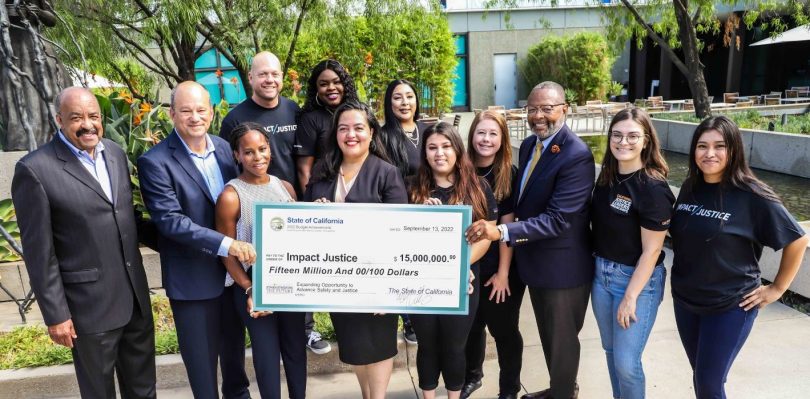With a $15 million pot of funding in California’s 2022-23 budget, the organization Impact Justice will expand their highly successful Project Homecoming into Los Angeles. The program, first launched in Alameda County, pairs people leaving prison with local residents willing to share their homes.
With the new pot of funding, Impact Justice will be able to establish and operate Project Homecoming in LA over the next three years, directly addressing the conditions that lead formerly incarcerated people to be nearly 10 times more likely to be unhoused than the general public.
Since 2018, the" frameborder="0" allowfullscreen> project has helped people returning to their communities after incarceration to avoid homelessess and re-incarceration. During its first year, Project Homecoming paired 15 people exiting prison with Bay Area homeowners who received subsidies for taking on new housemates. Project Homecoming hosts receive a $30 stipend per day — or $900 a month – for up to 6 months.
The program has since helped 65 more people find housing and stability in an era of severely unaffordable housing, and won the 2021 Ivory Prize for “ambitious, feasible, and scalable solutions to housing affordability.”
Project Homecoming’s recidivism rate is zero — none of the 80 participants have been reincarcerated.
“I am proud to have secured $15M for Impact Justice through our state budget,” said Assemblywoman Wendy Carrillo (D-Los Angeles), Chair of Assembly Committee on Budget, Subcommittee No. 4, which oversees workforce development, and Chair of the Select Committee on Young Girls and Women of Color.
Assm. Carrillo announced lawmakers’ change-making $15 million allocation to Impact Justice on September 13, alongside Assemblymember Reggie Jones-Sawyer, Impact Justice President Alex Busansky, and Dr. Robert Ross, President and CEO of The California Endowment in Downtown LA, where the press conference was held.
“Impact Justice programs, in particular, the Homecoming Project, will bring meaningful change that aligns with our state’s values to reduce recidivism rates and create safe and healthy communities,” Carrillo said. “This investment means that fewer people will end up on our streets, fewer people will cycle in and out of prison and in and out of poverty, and fewer families will be torn apart.”
Reggie Jones-Sawyer, who serves as Chair of the Assembly’s Public Safety Committee, praised the temporary housing program for providing “a foundation for which many formerly incarcerated can reestablish their lives.” Expanding Project Homecoming is “a great first step,” Jones-Sawyer said.
“Here in Los Angeles,” said The California Endowment’s president, Dr. Robert Ross, “with organizations like Impact Justice exerting their voice and their leadership and the experiences of people who’ve actually been in and out of the justice system — we are trying to assert a ‘care as the first resort, and jail as the last resort’ approach to reforming juvenile justice and the adult incarceration system.”
In addition to funding Project Homecoming expansion into Los Angeles, the $15 million will boost Impact Justice’s successful partnership with Americorps, through which formerly incarcerated individuals serve as reentry coordinators for justice-involved young people.
WitnessLA wrote about the Amercorps partnership, called California Justice Leaders (CJL), and one of its senior reentry coordinators, Sergio Coronel, in June.
In the upcoming year, CJL will double the number of reentry coordinators, or Justice Leaders, who will then be able to mentor 275 justice system-involved young people every year.
The money will also fund a career training program focused on indoor, vertical farming, which Impact Justice says is expected to become a $9.7 billion industry by 2026.
Additionally, Impact Justice will use some of the budget allocation to improve data and outcome tracking for all of its programs.
“We’re going to use these dollars to open doors to homes, to jobs, and to other life expanding and enriching opportunities that pay dividends when the beneficiaries of these opportunities give back to their communities — and they do. We see that every day,” said Alex Busansky, President of Impact Justice, who also served on the Citizens’ Commision on Jail Violence (CCJV), and who was previously a federal prosecutor and trial attorney in the Civil Rights Division of the U.S. Justice Department.
Busansky introduced Eric Anderson, one such Impact Justice client who has dedicated his time to improving his community.
“I started working with at-risk youth while I was incarcerated,” said Anderson. “And once I heard about California Justice Leaders — all they said was we have a chance to go inside and talk to some of these youth — I said, sign me up.” He realized he had been one of those kids, he said. “I never had reentry partnership,” which is what CJL offers.
After two years of working as a reentry coordinator through CJL, he felt compelled to continue the work of helping teens and adults with the challenges they face after returning to their families and communities.
“I know what it looks like getting out after 20 years, getting your license, getting your social security card, having to feel that no one’s gonna hire you,” Anderson said. “Impact Justice has given me a chance to give back, and that’s all I’ve been doing.”
Lead image via Impact Justice: Assemblymembers Wendy Carrillo and Reggie Jones-Sawyer, Impact Justice President Alex Busansky, The California Endowment President Dr. Robert Ross, and members of Impact Justice’s programs.
Correction, September 19, at 4:00 p.m.: This story originally stated that through the California Justice Leaders program, formerly incarcerated young adults mentored youth in juvenile halls. However, most of CJL’s reentry coordinators are in their 30s and 40s, and not all of the young beneficiaries are in lockup when they first receive services and mentorship.


Like to see a story on the ex-cons Celeste ant Taylor are taking in. I mean this is such a great idea they have to be stepping up, right? I’d hate to think they’re the Martha’s Vineyard type liberals.